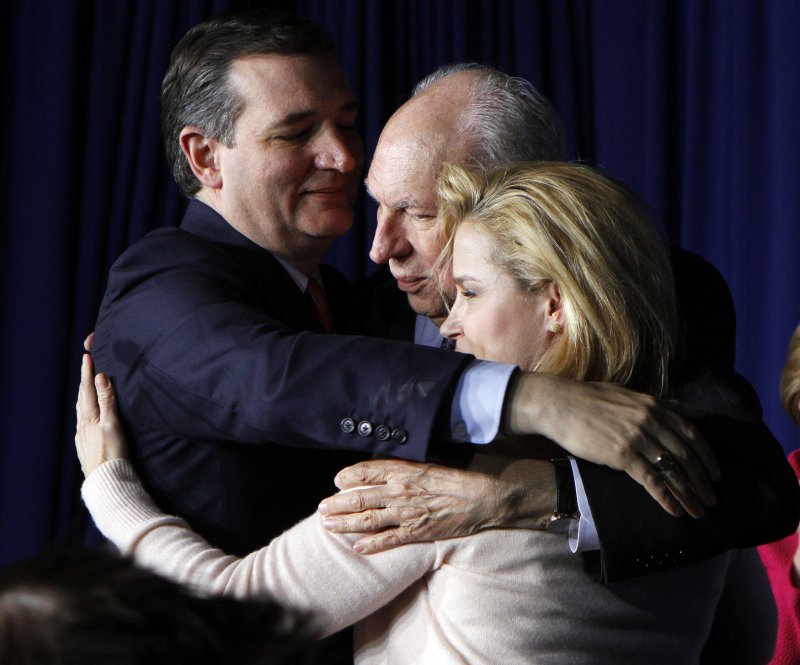1 of 3 | Republican presidential hopeful Ted Cruz (L) hugs his father Rafael (C) and wife Heidi after he delivered his concession speech to supporters at an election night rally in downtown Indianapolis on Tuesday night. After losing the all-important Hoosier state, Cruz bowed out of the Republican presidential primary. Photo by Frank Polich/UPI |
License Photo
WASHINGTON, May 3 (UPI) -- Ted Cruz will not be the Republican presidential nominee in 2016, but in terms of presidential politics, the story of the Cruz campaign will go down in the history books as one of the most improbable conversions a candidate has ever undergone.
The junior senator from Texas began the race as the quintessential firebrand outsider -- loathed by many of his Senate colleagues, an unequivocal opponent of establishment politics and a darling of the GOP's Tea Party wing who almost single-handedly brokered a government shutdown.
He ended the race with the most endorsements from those very senators whose blood he made boil and, when he suspended his campaign Tuesday, was the embodiment of the Republican establishment's last, best hope to stop Donald Trump, a candidate who many in Washington circles disliked even more than Cruz.
As Trump's rivals dropped away one by one, Cruz emerged as the only candidate who stood even a modest chance of denying Trump the Republican nomination. For a while it appeared that effort was gaining momentum. Cruz rallied establishment figures angst-ridden over Trump's unorthodox campaigning style to his side.
But the transition from outsider to insider, however hesitant, did not come without consequences. Trump brandished the moniker "Lyin' Ted" ceaselessly on the campaign trail and on Twitter, casting Cruz as a typical Washington politician, bought by special interests and willing to say or do anything to win an election.
That dynamic was most evident in one state: Wisconsin.
It was there that the two men engaged in an extended feud involving their wives, which produced perhaps the most personal invectives in a Republican campaign that has featured many, many of them. Trump took offense to a super PAC ad online that targeted his wife, Melania, for nude photos the former model took as part of a magazine interview.
Though the Cruz campaign had nothing to do with the ad, Trump threatened to "spill the beans" (which to this date remain un-spilled) on Cruz's wife, Heidi. Cruz defended his wife and Trump shot back, retweeting a supporter's side-by-side image of an unflattering picture of Heidi Cruz, next to a glamorous Melania Trump.
The broadside attack on a rival's wife's appearance drew round condemnation against Trump from politicians across the political spectrum and only added to the stop-Trump movement gaining steam in Wisconsin.
After Cruz's Badger State victory, a brokered GOP convention was at least a possibility, though still not the most likely outcome.
Then it all changed.
From there, the campaign arrived in Trump's native New York, where he turned around a former Cruz attack that once appeared potent, but in the end may have doomed his campaign.
When Cruz assailed Trump's "New York values" on a debate stage in Iowa back in January, it was a savvy dog whistle to conservative voters that Trump didn't share their heartland values. It played well in Iowa, where Cruz scored what many considered an upset win to begin the campaign.
By the time the race reached its critical stage, the remark came back to haunt Cruz. Fresh off his Wisconsin victory, Cruz needed to continue building momentum for the anyone-but-Trump movement. Instead, he got run over by a New York City subway train.
Cruz was heckled mercilessly while campaigning across the state, particularly in New York City. He was taunted by the tabloids, hollered at by angry residents of the south Bronx and threatened with a boycott by a group of schoolchildren.
To the surprise of virtually no one, Trump won 62 percent of the New York vote, scored a huge delegate haul and reaffirmed the position he had occupied since last fall, atop the Republican field. Cruz finished a distant third.
The campaign map did Cruz no favors after New York, either. The campaign remained in the Northeast, where he was shut out of the delegate haul in five states, a humiliating defeat that set up Indiana as the Texan's personal version of the Alamo.
Cruz once held a substantial lead there, but saw it evaporate as Trump gained momentum from previous victories. Seeking to shake up the race, Cruz named top surrogate and former candidate Carly Fiorina his would-be running mate. It didn't help. Fiorina was widely panned after breaking into an impromptu song about Cruz's children when publicly accepting his offer to appear on a ticket no one bought. Then, in what can only be described as a painfully obvious harbinger of doom, Fiorina took a nosedive off a stage after introducing Cruz at a rally Monday.
Ultimately, Indiana's results would be much the same for the Cruz campaign, a public face-plant.















